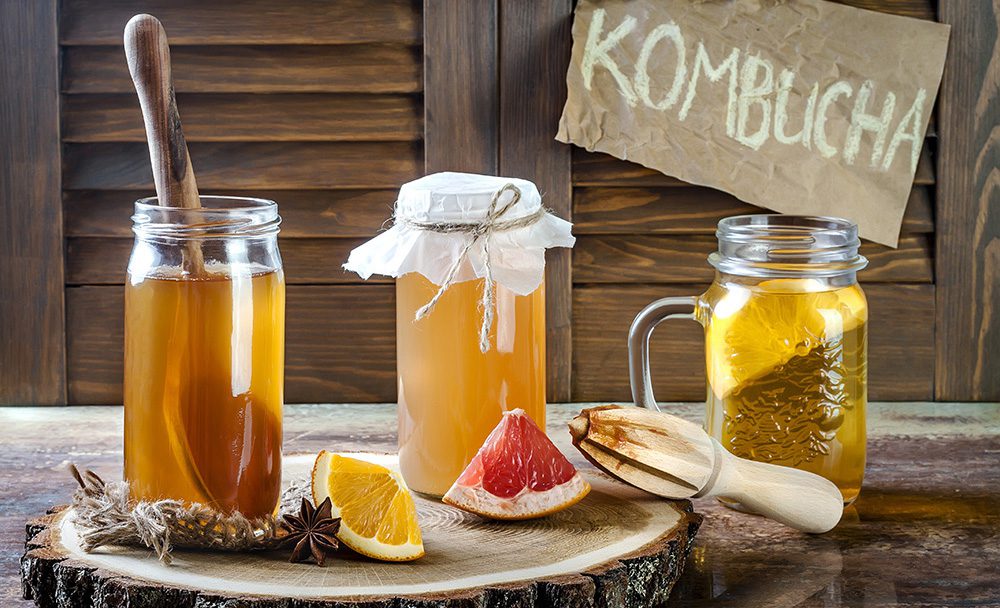The popularity of kombucha, a fermented concoction of bacteria, tea and sugar that has long been touted for its health benefits, is at an all-time high, but does the fizzy elixir deserve the hype?
It’s the beverage all the cool kids are drinking, and while it didn’t begin its meteoric rise to mainstream in the West until the 1990s, the fermented favourite has had a devoted fan club for over 2000 years.
Originating in Northeast China during the Qin Dynasty in 220BC, the fermented tea was prized for its healing properties. Centuries later it is believed that the Samurai warriors of Japan would carry Kombucha in their belts and drink it before battle for energy. In the 20th century the fizzy elixir, while maintaining its popularity in Chinese households, bubbled its away across expanding trade routes to Russia and Europe, and in particular Germany, where it was used for medical purposes to help injured soldiers during the First World War.
While a few decades ago kombucha was only found in health food stores in the West, today it’s as common as cola in convenience store refrigerators. In fact, with its promises of detox and inarguable benefits to gut and digestive health, the “booch” has become a staple of many people’s diets.
So, What Exactly is Kombucha?
At its most simple, Kombucha is a tangy, fermented tea – usually green, black, and oolong – brewed with a symbiotic culture of bacteria, enzymes and yeasts – affectionally known as a “kombucha mushroom” or SCOBY (Symbiotic Culture of Bacteria and Yeast) – and left alone to ferment for anything from one week to a month resulting in a carbonated concoction packed with probiotics and antioxidants.
Is Kombucha Really Good For You?
Research would suggest so. Properly made kombucha is rich in probiotics and antioxidants that help flush your body of toxins and harmful bacteria, a good kombucha can keep gut flora healthy and functioning properly, and support immunity. Studies have demonstrated that kombucha can assist with inflammation and digestion, improve liver function, lower cholesterol, manage blood sugar and support healthy weight loss.
What Can it Do For Me?
The result of the fermentation process is a concoction packed with probiotics and antioxidants that help flush your body of toxins and harmful bacteria and assist in the creation of healthy bacteria for your gut. But initial research into the benefits of kombucha show that, when properly made, kombucha may also assist with;
- Increased Immunity – Kombucha’s combination of healthy components like vitamins, antioxidants, and probiotics can assist in creating stronger immunity.
- Lowering cholesterol – Kombucha contains gallocatechin which studies have indicated can help lower cholesterol and improve heart health.
- Supports gut health – Kombucha is packed with probiotics that provide your gut with healthy bacteria that aid in digestion, protect against gut inflammation and assist with good gut health.
- Weight Loss – Kombucha’s gut friendly probiotics can help fat to be burned faster while the acetic acid helps to reduce hunger and bloating, and can stop the body from turning food into fat.
- Reducing blood sugar levels – A 2012 study suggested that kombucha helps to slow the digestion process of carbs and reduce blood sugar levels, which can greatly benefit people with Type 2 Diabetes.
- Improved liver health – The high levels of antioxidants in kombucha may help protect the liver from oxidative stress and eradicate toxins from the body to help improve liver function.
- Protection against heart disease – Some studies have indicated that kombucha can help to improve “bad” LDL and “good” HDL cholesterol, while the tea component can also protects against LDL oxidation thought to contribute to heart disease
- Relieving joint pain and inflammation – A regular intake of kombucha is believed to help relieve joint pain caused by inflammation.
- Better sleep – Sleep is essential to health, and kombucha’s beneficial enzymes help process undigested food that can lead to the gut imbalances that impact quality sleep.
- Increased energy – We can all benefit from a little more energy and observational studies suggest that kombucha can improve energy levels.
Not all Kombucha is Created Equal
Whether you brew your own or buy from the supermarket shelf, every kombucha is unique as the ingredients used to the actual fermentation time and temperature and bottling process vary. Some commercial kombucha brands contain no live culture at all as the pasteurisation process used to make them shelf-stable can destroy probiotics. Some brands also add sugar and sweeteners post fermentation and others add carbonation to shorten fermentation time, instead of letting the bubbles form naturally. All these factors not only impact the taste but can impact the nutritional benefits of the kombucha you are drinking.
This article provides general information only, and does not constitute health or medical advice. If you have any concerns regarding your health, seek immediate medical attention.








